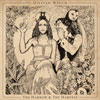GILLIAN WELCH : THE HARROW & THE HARVEST
- Scarlet Town
- Dark Turn of Mind
- The Way It Will Be
- The Way It Goes
- Tennessee
- Down Along the Dixie Line
- Six White Horses
- Hard Times
- Silver Dagger
- The Way the Whole Thing Ends
Label : Acony Records
Release Year : 2011
Length : 46:01
Review (AllMusic) : The title - The Harrow & the Harvest, Gillian Welch's first album of new material in eight years - reflects a creative drought: she and David Rawlings simply weren't writing songs they liked. The music is steeped in the early country, bluegrass, and Appalachian mountain traditions that are her trademark -though it engages rock and roll and blues motifs albeit acoustically-while the melodies and lyrics reflect the darkness and melancholy of Gothic Americana. Produced by Rawlings, this set returns to the sparse instrumentation of her earliest recordings: guitars, banjos, harmonica, and hand-and-knee slaps. The album illustrates a near-symbiotic guitar interplay; rhythms, melodies, and even countermelodies are exchanged organically, interlocked in the moment. The protagonists in these ten songs are desperate, broken, and hurt individuals; some stubbornly cling to shreds of hope while others resign themselves to tragedy even as they go on; still others, like the one in the opener "Scarlet Town," reflect anger and the wish for vengeance. What they hold in common is their need to tell their stories through Welch's plaintive contralto. "Dark Turn of Mind," a painful love song, embodies the truth in confessing the past as a warning even as its subject wills a new future. "The Way It Will Be," a fatalistic folk ballad, is the first of three songs with the words "The Way..." in their titles; its line "You've got me walking backwards/Into my home town..." sum up each of their sentiments, albeit in different ways. "Tennessee" is among the finest songs Welch has ever written. A sultry, darkly sexual ballad that has more in common with rock than country in its musical framework, its subject is conflicted between learned morality and an instinctive desire that expresses no need for redemption: "I kissed you cause I've never been an angel/I learned to say hosannas on my knees...I always try to be a good girl/It's only what I want that makes me weak....Of all the ways I've found to hurt myself, you may be my favorite one of all...." The knee slaps, banjo, vocal harmony, and harmonica in "Six White Horses" is startlingly, and paradoxically, mournful and defiant; its melody rooted in the Appalachian tradition, she transcends it with a particularly poignant lyric. Despite its gentle presentation, "Hard Times" is steely and determined, even as its languid presentation displays evidence to challenge the protagonist's spirit. "Silver Dagger" is not the Joan Baez song of the same name, but a midtempo murder ballad that proclaims "I can't remember when I felt so free"; so much so that the subject welcomes her killer. The set closes on "The Way the Whole Thing Ends," a shimmering blues, with Welch's protagonist leaning wryly into the lyric with an ironic shrugged-shoulders acceptance at the inevitable return of a faithless lover. The Harrow & the Harvest is stunning for its intimacy, its lack of studio artifice, its warmth and its timeless, if hard won, songcraft. Its only equal in her catalog is Time (The Revelator), making it well worth the long wait. [Note: the provocative cover art by Baroness guitarist and vocalist John Dyer Baizley is peerlessly brilliant.]
